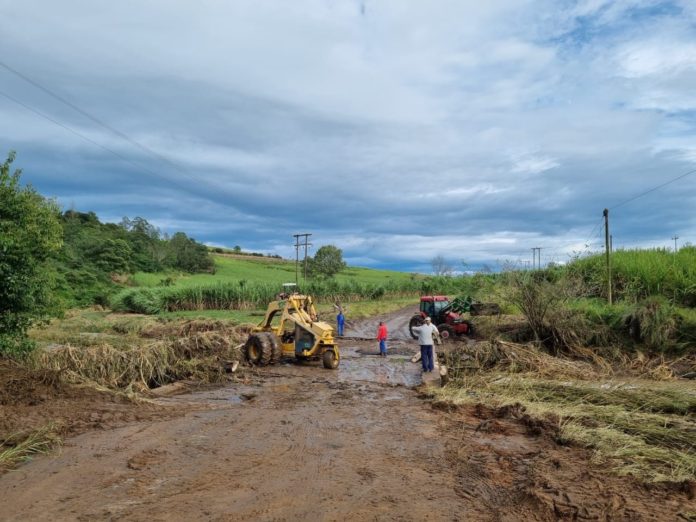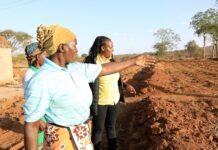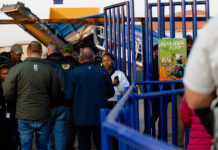Tired of waiting on local government to repair key rural access roads that are crucial to financial livelihoods and sustained food supply in and out of communities, KwaZulu-Natal farmers have embarked on their own restoration efforts following further damage caused by the recent floods.
The state of the majority of rural roads across the province have been in the spotlight recently due to the neglect of maintenance and upgrades to rural infrastructure throughout KZN. The heavy rains of the past two weeks, where some areas saw as much as 400mm fall over 24 hours, has now resulted in many rural single access roads being washed away, being rendered nearly impassable or near a state of collapse.
Main rural access routes into and out of Mid-Illovo and some parts of Creighton have been severely affected. In Mid Illovo, main access to the community was cut off when a low-level bridge was completely submerged by the flooding.
“Sugar and timber could not be transported out the district and diesel drops were impossible; resulting in the complete halt of farm operations, no food and no income. Should an emergency have taken place, ambulances, police and security companies did not have access. We have no schools in the area and children couldn’t get to school. The impact was immense,” said Brett Chubb, Chairperson of the Mid-Illovo Farmers’ Association.
Fixing the rural roads in Mid-Illovo is a large undertaking; requiring the community to use their own funds to restore them to working order.
“We have used 15 tractors and trailers, five TLBs, brush cutters, chainsaws, quarry and rock loads. In addition, each of these needed drivers and operators, and a further eight conductors, eight supervisors and 60 staff members were needed to get the job done,” said Chubb.
Taxi owners in the area are also demanding action in repairing the roads, and protested on Tuesday morning (26 April 2022) by burning of tyres along District Road P118 in Mid Illovo.
“We have very good relationships with local taxi drivers and they have expressed their thanks for the work we are doing to repair the roads. If farmers had not taken it upon themselves to fix these roads, there would be dire consequences for the community. We will do anything to ensure that the roads in the district are safe and functional again,” said Chubb.
In Creighton in the Harry Gwala District, farmers have taken it upon themselves to repair roads that have been totally washed away.
Road D170 between Creighton and Tarrs Valley, which is home to several small communities was totally washed away during the flooding two weeks ago. To date there has been no acknowledgement from local government on the state of the road. The local community, which use the road to get to and from work on farms and businesses in Creighton, now have to navigate the massive five meter wide sink hole by foot.
Creighton farmer, Hayden Stokes, has set about repairing the road himself.
“At the farmer’s expense, at nearly R20 a litre of diesel this is what we have to do gain access to use our roads. It is disastrous for farmers and rural communities who depend on these roads. Roads have become nearly impassable and have become dangerous to use; we are now filling with shale to try and prevent the road from further falling away,” said Stokes.
Prior to repairing roads that their own cost, both Mid-Illovo and Ingwe Farmers’ Associations were in constant communication with the Department of Roads and Transport.
“We provided letters from all those who have been affected by the state of the roads, have had numerous meetings with different stakeholders and have taken officials onto the roads to show them our concerns. When roads have been repaired, these problems reoccur shortly afterwards and as a result, we’ve have had further meetings regarding the poor manner in which roads have been repaired,” said Chubb.
“We have had several meetings with the department, have sent many letters and have taken them to see the roads. With no response and no timelines on when the road will be repaired, we had to do something about it ourselves,” said Stokes.
To address the need for collective action at District level and to seek urgent action, the KZN Agricultural Union, Kwanalu, has been implementing a Roads Campaign. The campaign looks to work within the relevant structures at local, district, provincial and national level amongst seeking other interventions.
Kwanalu, on Wednesday 13 April 2022 hosted a high level Roads Impact Webinar together with leaders of the province’s Farmer’s and Landowners Associations to deliberate the chronic state and continued decline of rural roads in KZN, the impact of this on food security and a way forward to receiving urgent action in addressing these concerns. The meeting was also attended by leaders of Agri Eastern Cape and Agri Free State.
“The collective effort of provincial agricultural unions is essential to invoking urgent action on a problem that affects everyone in the country. Agriculture and rural livelihoods are affected, but so too are the general public who rely on this supply chain for food,” Kwanalu CEO, Sandy La Marque told delegates.
Currently Kwanalu is awaiting feedback to meetings requested with the KZN MEC for Transport, Community Safety and Liaison, Ms Peggy Nkonyeni, the Department of Transport Director General, Alec Moemi and other relevant officials.
“We hope to receive a response for engagement soon. If not, we may have to look into legal and practical support as advised by key speakers from other provincial unions during the webinar,” said La Marque.
Stakeholders from all levels of the value and supply chain are urged to take action in reporting poor road conditions to facilitate in making KZN’s infrastructural repairs and maintenance a priority.
“We require government, municipalities, stakeholders and leadership to be working together at all levels to ensure that the focus of attending to the matter of infrastructure is done with the key economic implications in mind. When we work together, more can be done – a lesson that was learnt during the riots that tore through our rural areas last year,” said La Marque.
For more information on Kwanalu visit www.kwanalu.co.za or call (033) 342 9393.









